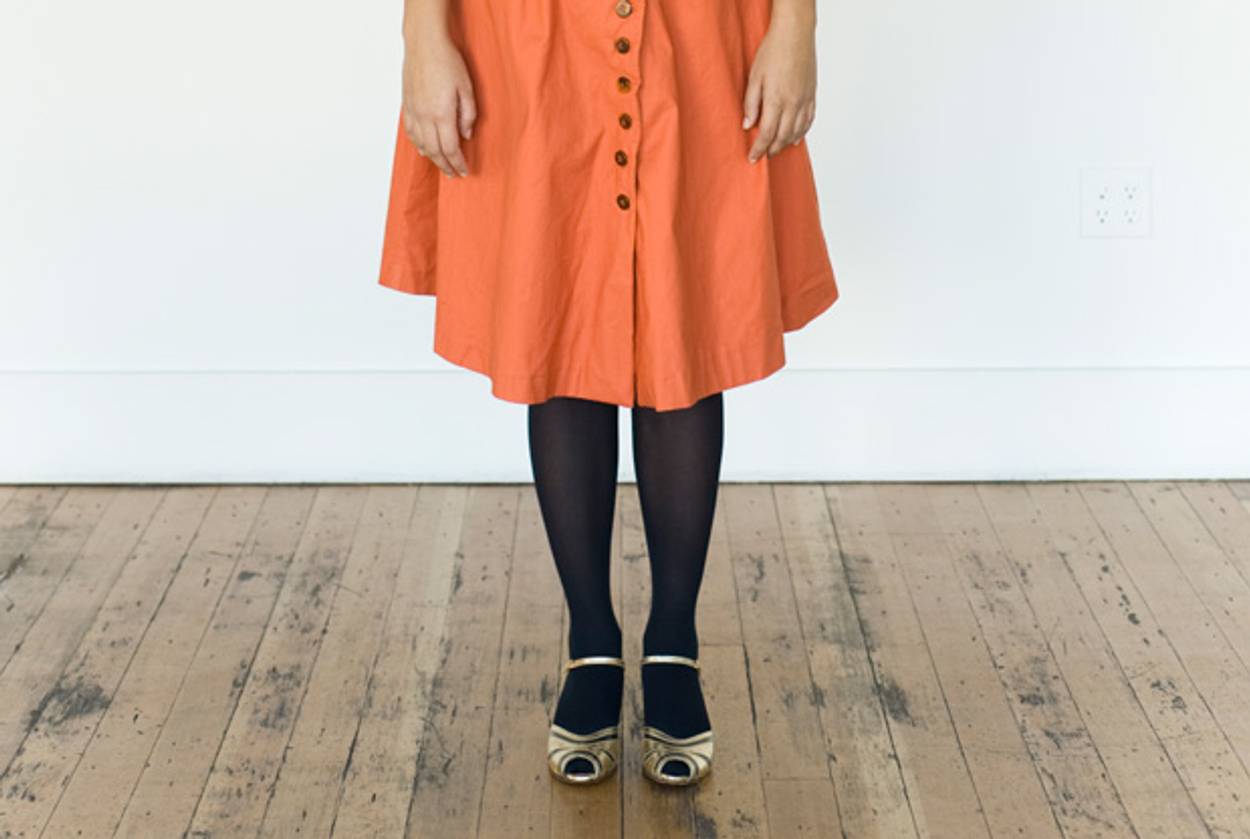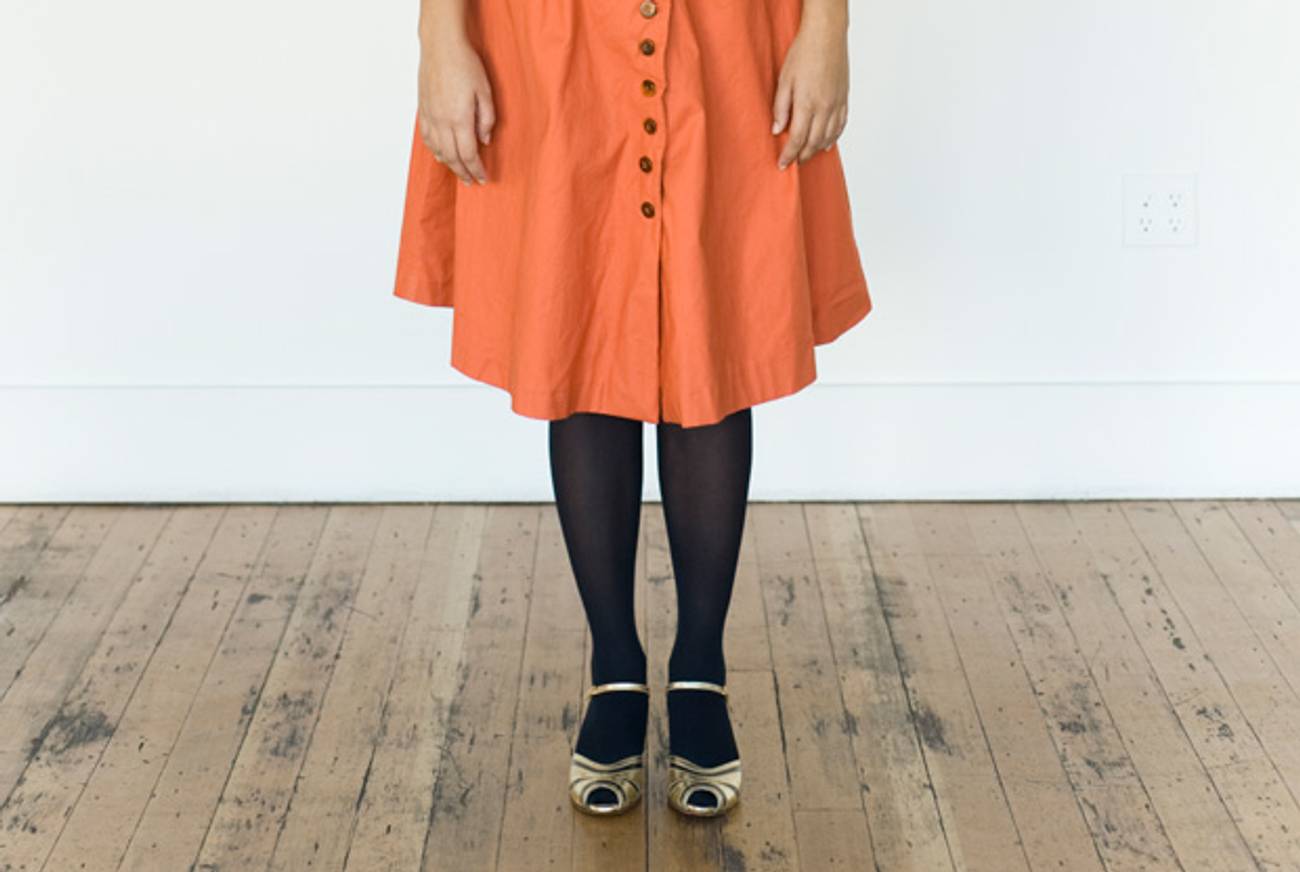Frock Stars
A roving consignment shop run by two Australians helps its Orthodox Brooklyn clientele navigate the line between modesty and style




One day last October, Chaya Chanin, an Orthodox Jewish woman, sent her two children to the zoo with a babysitter and transformed her three-bedroom apartment in Crown Heights into a high-end boutique. A pink sign outside welcomed clients to the Frock Swap, a roving consignment shop that Chanin and her sister Simi Polonksy have been running for almost a year and a half. Mannequins in the living room display vintage dresses, and pop music streams through the “dressing room” (the bedroom), “the cashier station” (the kitchen), and “the accessory table” (the dining area). Over a dozen Orthodox Jewish women, who heard of the sale through friends and Facebook, flip through the racks. “Isn’t this just divine?” says one shopper of a silk Chloe shirt.
Outside, on Kingston Avenue, religious men wear black hats and white shirts. The women have on floor-length jean skirts and long-sleeve solid-colored T-shirts. It is easy to understand why they dress this way: Jewish modesty laws are strict, requiring women to cover their elbows, knees, collarbones, and, if married, their hair. But the Frock Swap caters to a different set: religious women who believe they can dress modestly without sacrificing individual panache.
“People want to feel like they look normal, not a frummy religious nerd,” says Chaya, 27, who wears a bold floral top that complements her long, wavy wig. She and Simi, dressed in a two-tiered black sheer top with a skirt that stops just past her knees, hand-pick used, stylish clothes from their friends and sell them once a month either in a rented store or someone’s apartment. A percentage of the money goes to the consignors, and the rest they use to expand their business. Eventually, they’d like to have a pop-up store and perhaps warehouse space to house clothing from a larger network of buyers.
At the sale, Chaya welcomes customers into the store with a glass of wine, and Simi suggests looks. “Can I put a shirt underneath this dress?” asked a customer holding up an emerald, satin, short-sleeved dress. “Let’s try this,” says Simi, who had a brief career as a personal shopper for her mother’s friends in Australia, rushing over with a sharp black blazer, “You’re going to look gorgeous.” Simi says she has to resist the urge to tweak strangers’ outfits. “How could you wake up in the morning and think that you actually look OK?” she admits to thinking of some people she sees on the street.
According to Jewish tradition, explains Sara Labkowski, the director of Machon Chana, a Crown Heights yeshiva program for young women, helping girls dress well is an admirable pursuit. “When we feel well dressed, we can do much more,” she says. “We can be better mothers and wives and community members.”
But that’s where Labkowski’s approval ends. Frock Swap offers clothing that fits a variety of comfort levels: form-fitting dresses, shirts that are too low on their own but can have fabric sown into them, red lace bras that a young woman might (or might not) feel comfortable wearing in front of her husband. While the store does not sell items such as mini-skirts or pants, Labkowski believes that some of its clothing isn’t modest enough. “We have a lot of teenagers, a lot of kids, looking for guidance. They are falling prey to things that are wrong, thinking they are right,” she told me. She believes girls with non-modest clothes might be tempted into following their yetzer hara, or evil inclination.
But for Simi and Chaya, letting women make their own choices about clothing is only natural. They grew up in Sydney, Australia, where girls walked around in bikinis and revealing summer dresses. While they strictly adhere to Jewish law, their father, who is a rabbi, encouraged them to be open to people who practice religion differently.
Liat Rubin, Simi and Chaya’s childhood friend from Australia who visits the Frock Swap sales when in town, is a recent convert to modest dressing. After acting “like everybody that lived by the beach,” she realized she was attracting what she called the wrong type of attention from men. She switched to wearing modest clothes and feels good about the choice: “When I feel like I put an outfit together that looks great and it’s working within the boundaries I am more proud of myself.”
Others say there are clear downsides. “If you ask me if it restricts me, totally!” says Mimi Hecht, who writes a blog about being a mom in Crown Heights. “I can’t say how many times I went shopping with a friend and I’m like ‘It’s so crazy, this is so stupid.’ ” Chaya wishes she could go for a jog without putting on a wig or a hat. “For me it’s challenging to keep being inspired about the way I live and what I do,” admits Simi. “No matter how strong you can feel about something, the world is tempting.”
Alyson Krueger is a journalist living in New York.
Alyson Krueger is a journalist living in New York.